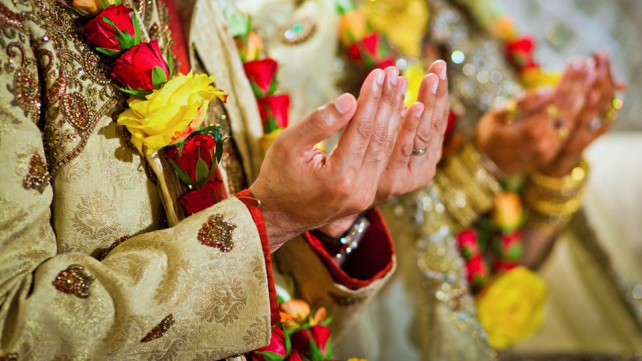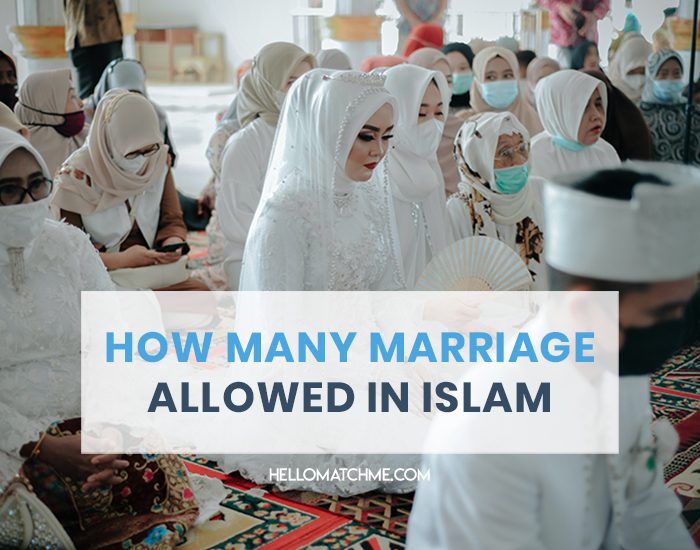There is no limit to the number of marriages in Islam. A man may have up to four wives at one time, as long as he can treat them all fairly and provide for them financially. polygamy is only allowed if a man is able to treat his wives equally and justly.
If he cannot do so, then he must marry only one wife.
In Islam, marriage is a blessed contract between a man and woman. The Quran states that marriage is “half of the religion” because it helps to promote chastity and provide a stable, loving environment for raising children. Although polygamy is allowed in Islam, it is not encouraged and can only be practiced if the husband can financially support multiple wives and treat them all fairly.
A man is also allowed to marry up to four women at once, but this practice is very rare nowadays.

Conditions to Marry a Second Wife in Islam
In Islam, there are certain conditions that must be met in order to marry a second wife. First and foremost, the husband must be able to financially support both wives equally. Additionally, he must treat both wives with kindness, love, and respect.
Finally, he must be willing to divide his time fairly between both wives. If these conditions are not met, then marrying a second wife is not allowed in Islam.
Muslim Marriage Rules
In Islam, marriage is a legal contract between a man and a woman. Both the groom and bride must be willing and able to consent to the marriage of their own free will. A marriage contract is signed in the presence of witnesses and then registered with the local authorities.
The purpose of marriage in Islam is to protect both men and women from committing immoral acts outside of wedlock, as well as to provide for mutual love, companionship and support. Muslim marriages are not based on romance or sexuality, but rather on mutual compatibility and respect. It is important to note that forced marriages are strictly forbidden in Islam.
If either party does not consent to the marriage willingly, then it is void and considered null and void from the very beginning. Muslim marriages also have certain rules and regulations regarding divorce. In Islam, divorce is only permissible if all other avenues have been exhausted first, such as counseling or mediation.
The husband must initiate the divorce proceedings by pronouncing talaq three times in front of witnesses; after which, the wife has a waiting period (iddah) of four months during which she can reconcile with her husband if she so chooses. If at the end of this period they are still unable to resolve their differences, then Islamic law permits them to go ahead with divorce proceedings.
4 Wives in Quran
In Islam, polygamy is allowed under certain conditions and it is not compulsory. A man may have up to four wives if he can treat them all equally and justly. If a man cannot do this, then he is only allowed to have one wife.
The Quran gives several reasons why a man may marry more than one woman. For example, if a man fears that he will not be able to deal with his wives fairly, then marrying more than one woman is discouraged: And if you fear that you will not deal justly with the orphan girls, then marry those that please you of [other] women, two or three or four.
But if you fear that you will not be equitable [to them], then [marry only] one or those your right hand possesses from among them… (Quran 4:3) Another reason given in the Quran for why a man may marry more than one woman is widows: And provide for them from where you see fit and let them down easy kindly.
Types of Marriage in Islam
There are four types of marriages in Islam: nikah, urfi, nikah mut‘ah, and nikah misyar. Nikah is the Islamic word for marriage. It is a contract between a man and woman to live together as husband and wife.
The man must provide financial support for the woman, while the woman must obey her husband. A couple can divorce through talaq (divorce initiated by the husband) or khulʿ (divorce initiated by the wife). Urfi marriage is a type of customary marriage practiced in some Muslim countries.
It is similar to nikah, but it does not require witnesses or a dowry. The couple simply declares their intention to marry each other in front of their families. Urfi marriages are not as common as they once were, due to increased awareness of the rights afforded to women under Islamic law.
Nikah mut‘ah is a temporary marriage that was historically used by travelers who needed companionship during their journey. It is no longer common practice, but some Shia Muslims still recognize it. In a nikah mut‘ah marriage, the man and woman agree on a set period of time that they will be married (usually days or weeks), after which they will divorce automatically.
There is no need for witnesses or a dowry; however, the man must pay the woman an agreed-upon sum of money at the time of marriage. Nikah misyar is another type of temporary marriage that has become popular in recent years, especially among young people who want to avoid many of the financial and social responsibilities associated with traditional marriages. In a nikah misyar marriage, the couple agrees that they will live apart; typically, the husband will continue to live with his parents while the wife goes back to her own home or moves into an apartment near her husband’s parents’ house.
The couple only comes together for sexual intercourse; otherwise, they lead separate lives. Nikah misyar marriages do not usually last more than two years; after that point, either party can initiate divorce proceedings without having to give any reason why they wish to end themarriage .
How Many Times Can You Get Married in Islam?
There is no specific number of times that a person can get married in Islam. However, it is generally discouraged to have more than four wives at one time. The Quran says that men are allowed to have up to four wives, as long as they can treat them all fairly and equally.
If a man cannot treat his wives fairly and equally, then he should only have one wife.
How Many Wives Does Allah Allow?
There is a lot of debate surrounding this topic as there is with most religious topics. The Quran does not explicitly state how many wives a man is allowed to have, but it does say that a man should only marry if he can deal justly with more than one wife. This has led some to believe that a man can only have four wives at any given time.
Others argue that the Quran’s silence on the matter means that there is no limit set by Allah. And still others believe that a man can only have multiple wives if his first wife gives him permission to do so. It’s important to note that polygamy was common in Arabia at the time when the Quran was revealed and it was also practiced by Prophet Muhammad (pbuh).
So, it’s not surprising that the Quran would address this issue. What is surprising, however, is that the Quran doesn’t put any explicit limitations on polygamy. This has led to much debate and interpretation over what exactly Allah intended when He said that men should only marry if they can deal justly with more than one wife.
Some scholars argue that because justice is an inherent part of Islam, then it stands to reason that a Muslim man should be able to handle more than one wife justly before taking on such a responsibility. Others point out that the Quran specifically says “if you fear you will not be able to treat them with equal justice”, which implies that four wives is the maximum number a man can have without violating this commandment from Allah. Ultimately, there isn’t a clear cut answer and it seems like each person will have to come to their own conclusion about how many wives Allah allows based on their interpretation of Islamic scriptures.
Conclusion
Islam permits a man to have up to four wives, as long as he can provide for them financially and treat them all equally. This is not a requirement, however, and many Muslims choose to have only one wife.







